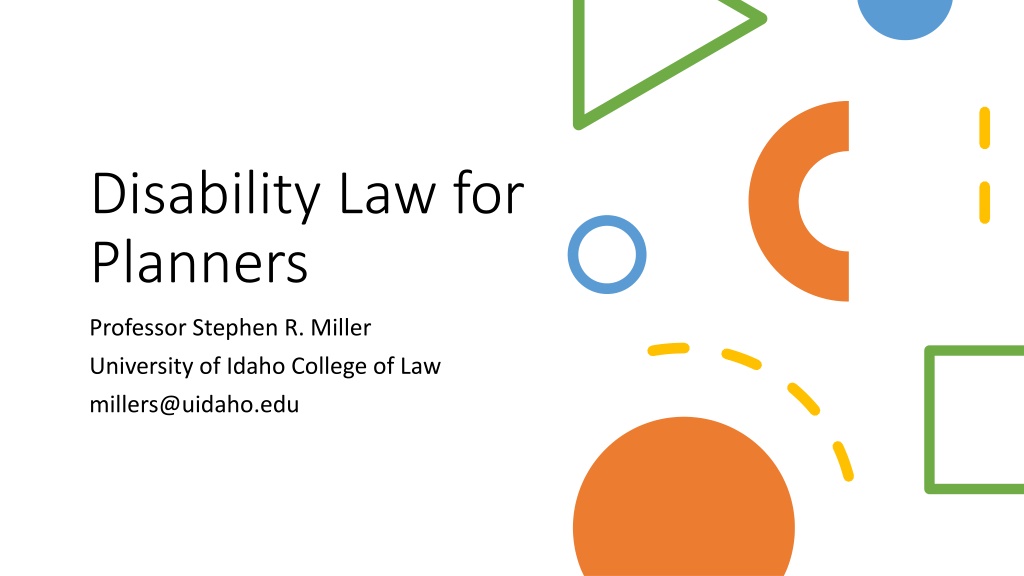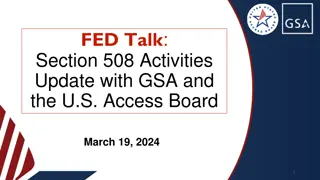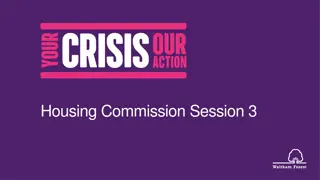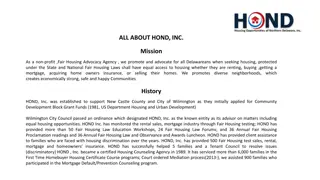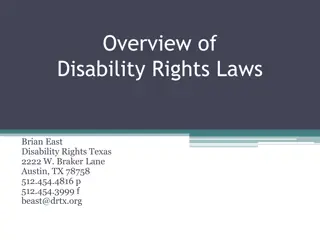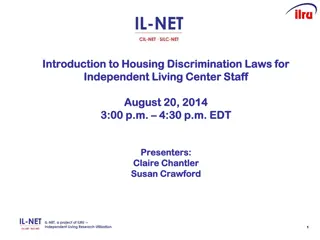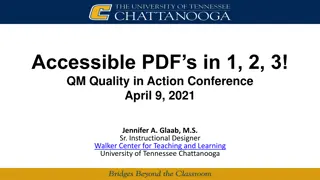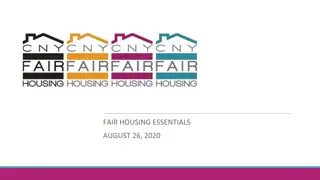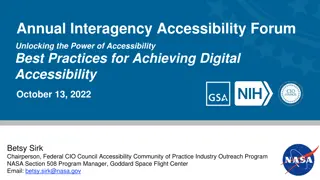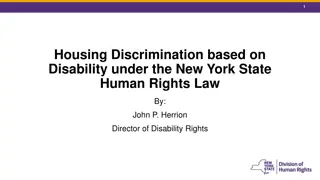Federal Laws Impacting Disability Accessibility in Housing
This presentation discusses five key federal laws that impact disability accessibility in housing: Americans with Disabilities Act (ADA), Fair Housing Act (FHA), Rehabilitation Act 504 (RHA), Architectural Barriers Act (ABA), and Executive Order 13217. It highlights the requirements and implications of these laws in ensuring accessibility and preventing discrimination based on disability in various housing aspects.
Download Presentation

Please find below an Image/Link to download the presentation.
The content on the website is provided AS IS for your information and personal use only. It may not be sold, licensed, or shared on other websites without obtaining consent from the author. Download presentation by click this link. If you encounter any issues during the download, it is possible that the publisher has removed the file from their server.
E N D
Presentation Transcript
Disability Law for Planners Professor Stephen R. Miller University of Idaho College of Law millers@uidaho.edu
Five federal laws to know Americans with Disabilities Act (ADA) Fair Housing Act (FHA) Rehabilitation Act 504 (RHA) Architectural Barriers Act (ABA) Executive Order 13217
Architectural Barriers Act Requires buildings and facilities that are designed constructed, latered, or leased by using certain federal funds after September 1969 to be accessible to and usable by people with disabilities Addresses construction-based standards of accessibility for new and renovated buildings Private market construction of single-family housing is not covered by the ABA
Rehabilitation Act 504 Prohibits discrimination based on disability in any program or activity that receives federal financial assistance Reasonable accommodations must be made for employees, and this includes the physical environment New construction and alterations must be accessible Section 504 covers housing programs that receive federal funding; does not cover privately funded single-family residential housing
Fair Housing Act Prohibits discrimination in housing on the basis of race, color, religion, sex, national origin, familiar status, or disability and applies both to private housing and public supported housing Covers selling ,advertising, leasing and financing of housing Zoning can also be covered. FHA requires owners and zoning officials to make reasonable exceptions to policies and practices to afford people with disabilities an equal opportunity to obtain housing This may require zoning officials to grant a variance or exception if a person with a disability can show that doing so is a reasonable accommodation (utilized a but for test) Can also mandate new multi-family housing meet inclusive design standards Design standards don t usually apply to single-family dwellings
Americans with Disability Act Requires accessibility Accessibility guidelines are published by the US Access Board as the ADA Accessibility Guidelines Title I: private employers must provide reasonable accommodations Title II: accessibility by state and local governments. Part A covers a range of programs, services, and activities. Part B covers transportation Title III: prohibits discrimination based on disability by any person owning, leasing, or operating a place of public accommodation Title IV: equal access to telecommunications systems
Executive Order 13217 Requires federal agencies to evaluate their policies and programs to determine whether any can be revised or modified to improve the availability of community-based living arrangements for persons with disabilities Applies to senior housing, group homes, provisionsof clinical or health services, etc.
Land use law and disability law Disability law does not preempt authority by public land use regulations, such as zoning, or private land use regulations, such as CC&Rs It may, however, require some alteration to the way those land use laws are enforced and applies
Group homes Issue: A zoning regulations prevents group homes in a specific district or it permits group homes, but provides for special or conditional review only for group homes that serve people with disabilities. Does this difference in treatment result in discrimination? Answer: Most likely. There will need to be a rational and important state interest in justifying different treatment for the group home for persons with disabilities.
Permeable surfaces / pavers Issue: Planning and zoning regulations require the use of sande for all pathways that lead to the waterfront of a river or lake. The stated purpose is to maintain permeable surface and reduce rainwater runoff problems. It creates a soft surface, which functionally limits access to the waterfront for those with mobility impairments. People with disabilities cannot enjoy the waterfront like others. Answer: Likely subject to a successful challeng. Local officials will need to be able to explain why there are no alternative ways of accomplishing the goal without providing some reasonable access for people with disabilities
Rehab centers Issue: Zoning regulations limit the local of drug rehabilitation centers. A potential drug rehabilitation operator seeks to locate in a zone that does not permit such centers. Should the operator be permitted to operate in the zone, even though the code prohibits operation in this location? Answer: A person with a disability and certain third parties can sue for a reasonable accommodation/modification. This leaves open the issue of determining the meaning of reasonable in this situation. There is a three- factor test: it must be (1) reasonable, (2) necessary, and (3) it cannot fundamentally alter the program, service or activity.
Boarding houses Issue: A not-for-profit organization seeks to open and operate a boarding house for women who are struggling with life controlling problems, which may include emotional stress or depression or the abuse of drugs and alcohol. Under the zoning code, group homes are restricted by a size limit, but this boarding house would seek to have twice as many people than permitted under the code. Org seeks an exception to the zoning code under laws that protect people with disabilitys. Key issues: (1) does the city have to provide an exception to its zoning ordinance; (2) what are the criteria for deciding the matter; (3) are women struggling with life-controlling issues within the definition of persons with disabilities; (4) what if only some of the women have a recognized disability? Answer: Not every member of a group has to meet the definition of a disability. Unclear what the percentage needs to be, but probably substantial. Use the 3-factor test to determine if accommodation/modification is reasonable.
Ramps in front yards Issue: zoning setback restriction prohibits the addition of a ramp to the front of a home because it extends into the front yard setback. Person with whellchair can only enter the home this way but for potentially putting a ramp in the back. If in front, can the city mandate the construction materials of the ramp? Answer: The ramp probably needs to be allowed as a reasonable accommodation. Whether at the front or the back will depend on a determination of what is reasonable, including what might be readily achievable in seeking to remove this barrier to accessibility. Design and materials can be regulated. This is true even if the regulations impose more costs on the person with a disability relative to some other design and the use of some other materials. Further, the removal of the ramp can be required for when the person leaves (e.g., the ability to have the ramp doesn t have to run with the land).
Service / emotion support animals Issue: zoning regulation prohibits horses, alpacas, donkey,s and pigs in single-family residential neighborhoods. A resident living ona once-acre lot has a miniature horse in her yard as a service and emotional support animal for her daughter. Neighbors complain about smell of manure. Can they keep the horse even though not otherwise permitted by zoning? Answer: Maybe. If it is a service animal under the ADA, it is likely permitted assuming sanitary and safety procedures are in place to prevent the service animal from being a danger to public health, safety, and welfare. If it is an emotional support animal, a zone variance will depend on an evaluation of what constitutes a reasonable accommodation under the circumstances. [since Idaho doesn t have use variances, perhaps a catch-all CUP may be advisable for all zones.]
Home offices Issue: Zoning code permits people to operate home offices in their homes. In this community, a number of lawyers and insurance agents have home offices in their single-family, residential homes. Even if the single-family home does not meet ADA design guidelines, must it do so if to the extent that the home office transforms part of it into a public accommodation? Answer: Yes. This includes an accessible pathway into the parts of the home used for meeting with the public
Sidewalks Issue: A city in a snowy region refuses to plow the snow from sidewalks during the winter. Sidewalks become inaccessible to those with disabilities. Group sues and claims that sidewalks are a service, program or activity of the local government, and as such, sidewalks must be maintained in an accessible manner. City responds that sidewalks are structures and not a service, program or activity of the local government. Answer: Sidewalks are not only facilities; they may be facilities that receive federal fundings. Likewise, sidewalks are considered programs, service, and activities of local government. In each case, sidewalks are covered under disability laws. The city needs to maintain the accessibility and usability of its sidewalls, which includes snow removal
Religious organizations Issue: A church building in a city does not have an accessible entrance. Does this violate disability laws or is there an exemption for a religious organization? What if church adds a daycare center? Answer: There is an exemption for religious organizations, but if they receive federal funds, they are subject to Section 504 of the RHA
Developers A commercial home builder develops subdivisions of single-family residential homes. In the subdivisions, the developer offers a choice of five different model homes from which consumders may select. None are accessible entry, and none offer a wheelchair-accessible bathroom. Wheelchair bound buyer asks for a home to be built with a ramp entrance and a larger, accessible first floor bathroom. Developer refuses. Violaiton of the FHA? Answer: Maybe. Single-family homes not not have very many accessibility requirements but a case can be made that with new construction a builder should offer some accessible options when requested.
HOAs - mobility Issue: Gated community prohibits buses on the private roads in the subdivision. One family living in the gated subdivision has a child with a severe mobility impairment and seeks to have the public school bus pick up their child and drop off at the house rather than at the public road outside the gate that is a half mile away from their house. Parents petition HOA for an exception to the rule, which is denied. Has the HOA violated the FHA? Answer: Probably, but it will depend on application of the three-factor test for determining if the request is reasonable
HOAs - fences Issue: Private subdivision governed by restrictive covenants has CC&Rs that prohibit yard fencing and enforced by HOA. Couple living in the subdivision has an autistic child who often runs out of the yard and into the street. To secure safety of their child, the couple petitions the HOA for the right to erect yard fencing on the property. Present HOA with doctor s certification of the disability and of recommendation for yard fence. Present board with a letter from the state authorizing payment for the fence and its installation. HOA denies request. Reasonable accommodation or modification violation under the FHA? Does it matter if it is in rules and regs versus CC&Rs? Answer: This is probably a violation. The fence is likely reasonable bt the HOA may put some conditions on how the fence is constructed and the materials to be used to build it. The HOA may also require that the fence be taken down when the child is no longer residing on the property.
